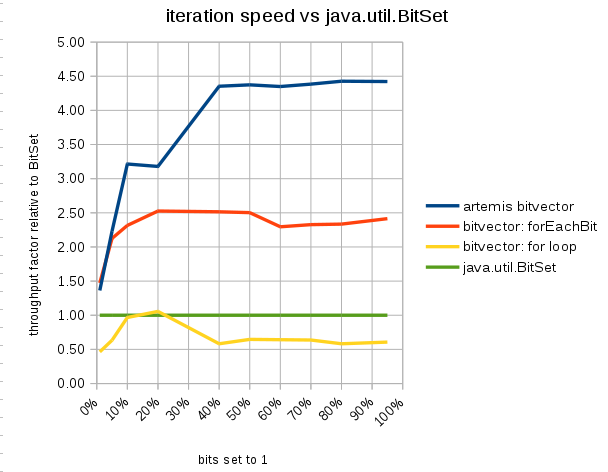junkdog / Bitvector
Programming Languages
Labels
Projects that are alternatives of or similar to Bitvector
BitVector
- Uncompressed, dynamically resizeable bitset, similar to
java.util.BitSet - Fast-ish enumeration of set bits (JS not yet profiled)
- Compatible with JavaScript and JVM/Android backends
- 4 byte words, avoids
Longemulation in js
- 4 byte words, avoids
The gist
Constructing
val bv: BitVector = bitsOf(1, 2, 56, 64, 128, 129, 130, 131, 420)
Individual bits
val bv = BitVector()
bv[142] = true // or bv.set(142)
assert(142 in bv)
bv.clear(142) // or bv[142] = false
assert(142 !in bv)
or, and, andNot, xor
As with java.util.BitSet, these operations mutate the callee. Do a copy() if the original BitVector needs to stick around.
These functions are not infix functions, as such syntax would suggest a value copy.
val a = bitsOf(0, 1, 2, 3, 120, 130)
val b = bitsOf(0, 1, 2, 120, 121, 122, 123, 130)
assert(a.and(b) == bitsOf(0, 1, 2, 120, 130))
// caveat: bitvector was mutated above
assert(a == bitsOf(0, 1, 2, 120, 130))
vs other BitVectors
// 1, 4 contained in other
bitsOf(1, 4) in bitsOf(0, 1, 4, 5, 6)
Looping over bits: fast way
bitsOf(*bits).forEachBit { println("bit $it says hi") }
Looping over bits: Iterable
// can be combined with filter/map etc
bitsOf(*bits).forEach { println("bit $it says hi") }
Getting Started
Maven: JVM/Android
<dependency>
<groupId>net.onedaybeard.bitvector</groupId>
<artifactId>bitvector-jvm</artifactId>
<version>0.1.4</version>
</dependency>
Maven: JavaScript
<dependency>
<groupId>net.onedaybeard.bitvector</groupId>
<artifactId>bitvector-js</artifactId>
<version>0.1.4</version>
</dependency>
Gradle: JVM/Android
dependencies { compile "net.onedaybeard.bitvector:bitvector-jvm:0.1.4" }
Gradle: JavaScript
dependencies { compile "net.onedaybeard.bitvector:bitvector-js:0.1.4" }
JVM Benchmarks / enumerating set bits
Mapping true bit positions into integers, inserting each into an IntBag (thin wrapper around int[]).
artemis-odb's BitVector was the basis for this implementation. The benchmark setup favors the artemis implementation, as it provides an optimized toIntBag method: it serves as a reference for best possible performance.
See jmh-logs for the full logs.
Discrepancy to artemis' BitVector is unwelcome. The implementation is for the most part the same, except that this implementation uses int for words, instead of long. 4 or 8 byte words did not have a significant impact on performance.
The for-loop performs poorly due to all the Integer boxing, extra indirection and allocation, compared to forEachBit.
java.util.BitSet suffers from not having a way of enumerating all bits at once, instead relying on repeatedly calling nextSetBit.
Tests
Verifying platform-specific implementations
mvn clean install -P impltest
Running JS tests
Build project, mvn clean install, then point the browser to file://$PROJECT_ROOT/js/target/test-classes/index.html

